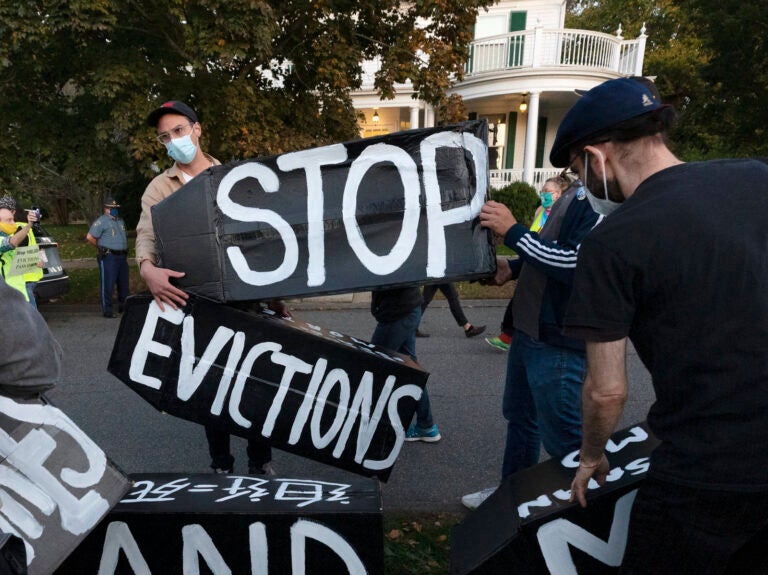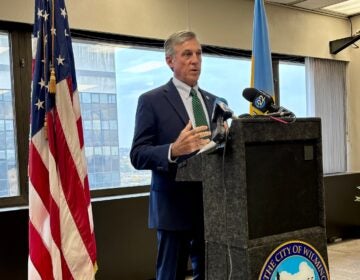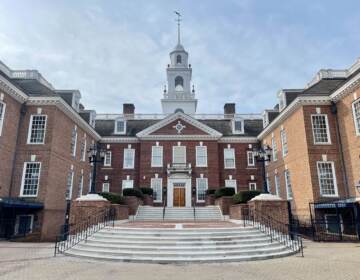Explainer: Will Pennsylvania evictions spike despite rental help?
As of June 7, roughly 3.2 million people in the U.S. said they face eviction in the next two months. Here’s the situation in Pennsylvania.

In this Oct. 14, 2020, file photo, housing activists erect a sign in front of Massachusetts Gov. Charlie Baker's house in Swampscott, Mass. (Michael Dwyer/AP)
A federal freeze on most evictions enacted last year is scheduled to expire July 31, after the Biden administration extended the date by a month.
The moratorium, put in place by the Centers for Disease Control and Prevention in September, was the only tool keeping millions of tenants in their homes. Many of them lost jobs during the coronavirus pandemic and had fallen months behind on their rent.
Landlords successfully challenged the order in court, arguing they also had bills to pay. They pointed out that tenants could access more than $45 billion in federal money set aside to help pay rents and related expenses.
Advocates for tenants say the distribution of the money has been slow and that more time is needed to distribute it and repay landlords. Without an extension, they feared a spike in evictions and lawsuits seeking to boot out tenants who are behind on their rents.
As of June 7, roughly 3.2 million people in the U.S. said they face eviction in the next two months, according to the U.S. Census Bureau’s Household Pulse Survey.
Here’s the situation in Pennsylvania:
What’s the status of eviction moratorium in the state?
Pennsylvania’s court-ordered housing eviction moratorium ended in August 2020, but there also have been local moratoriums in at least two cities. In Philadelphia, an order that requires landlords to go through the Philadelphia Eviction Diversion Program before seeking a court eviction for nonpayment of rent is also about to expire but advocates say it may be extended. In Harrisburg, a citywide eviction moratorium — which also extended to rooming houses — expired in mid-June. In January, the state Supreme Court modified rules for landlords, giving them more time to seek repossession of their properties.
What’s being done to help people facing eviction?
In January, Pennsylvania used its share of the federal pandemic housing relief money to set up the $570 million Emergency Rental Assistance Program, which helps with rent, overdue rent, utilities and other housing-related costs linked to COVID-19. Another $280 million went directly to the state’s larger counties and Pittsburgh. The program got running in March, but in some cases the money is just starting to be distributed.
There are tens of thousands of pending applications for the federal support in Philadelphia alone, according to Community Legal Services. There have also been grassroots efforts to support renters in Pittsburgh and Harrisburg. In the Harrisburg area, the Fair Housing Council of the Capital Region has conducted outreach, attending eviction hearings with renters and spreading information about the help they can provide.
Matthew Rich, a tenants’ lawyer for MidPenn Legal Services in Harrisburg, said Dauphin County has paid out rental support to slightly more than 200 applicants since March 1, but still has nearly 2,000 applications pending. “I don’t think it can be stressed enough how flooded the ERAP application system is across the board, across the state,” Rich said.
How are the courts handling eviction hearings?
Lawyers say procedures and practices have varied across the state, in some cases from courtroom to courtroom within a county. Early on during the pandemic, some judges put a hold on all eviction proceedings while others continued to evict renters for such issues as criminal activity, damage to a unit or having unauthorized people living in a home. Since early this year, courts have generally been handling eviction cases but not issuing final eviction orders in cases of nonpayment of rent. That has meant in many cases that landlords have not been authorized to take possession of their properties and change locks. Community Legal Services says about 2,000 renters in Philadelphia alone are poised to be evicted once the city courts begin to authorize that step.
How affordable is housing in the state’s major rental markets?
Experts say there is a shortage of quality affordable housing in Pennsylvania, with a significant percentage of renters paying 30% to 50% of their gross income on rent. “Like for a two-bedroom apartment, we’re looking at an average of $1,000” a month, said Rita Dallago with the Pennsylvania Residential Owners Association in Camp Hill.
Philadelphia is affordable compared to other big cities, but it’s the poorest of the nation’s 10 largest cities, making its housing less affordable for its residents. Rich said affordable rental units can often be of lower quality. “If you find a place that’s affordable, it’s usually affordable because there are problems with the property which make it affordable,” Rich said.
Are evictions expected to create a surge in people experiencing homelessness?
A recent U.S. Census Bureau study suggests more than 73,000 Pennsylvanians are somewhat likely or very likely to lose their homes to eviction over the coming two months. Many people involved with tenants and landlords fear there will be a spike in homelessness.
“That’s what we’re hearing,” Dallago said. “And we do have a housing shortage — there’s no two ways about it. And this housing shortage is going to get worse before it gets better.”
WHYY is your source for fact-based, in-depth journalism and information. As a nonprofit organization, we rely on financial support from readers like you. Please give today.






